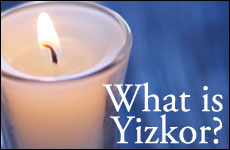 Iran’s Attack on Israel
Iran’s Attack on Israel


3 min read
Elevating the soul of a departed loved one.
Yizkor is a short prayer that has a deep spiritual impact on the soul of departed relatives and leaves a powerful emotional impression on those who say it.
Yizkor is founded on two fundamental Jewish beliefs; one, that the prayers and actions of people in this world can have an elevating spiritual effect on the souls of the departed, and two, that a primary, God-given mission in every person's life is to make the world a kinder, better, more beautiful place. In Jewish life, this pursuit of kindness is known as olam chesed yibaneh, "to build a world of kindness."
Yizkor is a beautiful expression of these ideas. The central element of yizkor is the commitment to make a charitable donation in honor of ones departed relative. By making such a commitment, you are affirming the belief that God wants us to do what we can to be helpful and alleviate the suffering of others. When you make an effort to help someone else, and do so in honor of a relative, then the relative becomes the motivating cause behind your act of kindness.
In essence, you and your departed relative become partners in this act of kindness. The result is that you become a better, more giving person, the departed soul of your relative is elevated and the recipient benefits from your kindness and generosity.
Just the Basics
1. The word yizkor means "to remember" and refers to a special prayer said on behalf of family members who have passed away.
2. Yizkor is an opportunity for living relatives to have an elevating spiritual impact on the soul of a departed loved one. For the person saying yizkor, it can be a very important reflective moment.
3. The yizkor prayer is recited during the synagogue prayer service on Yom Kippur and the holidays of Passover, Shavuot and Sukkot.
4. One begins saying yizkor on the first holiday after the person passed away.
5. Yizkor can be recited on behalf of any relatives, though people are most meticulous to say it on behalf of those for whom kaddish is said: parents, children, siblings and spouse.
6. Though the yizkor service is brief, it is customary for all congregants other than those who will be saying yizkor, to leave the synagogue while it is said.
7. If there is no synagogue where one lives, or if it is exceptionally difficult to attend synagogue, one may say yizkor privately at home.
8. It is customary to light a candle in ones home before sunset at the beginning of a holiday on which yizkor is said. If Yizkor will be recited on Saturday, the candle must be lit on Friday afternoon before sunset.
9. There are two parts to yizkor: 1) A brief prayer for the departed and 2) A commitment to give charity (tzedaka) on behalf of the deceased person's soul. In addition to a monetary donation, one can also commit to donate time to a charitable cause.
For people who are not familiar with the prayer service, and who may not read Hebrew, there are always people in synagogue who are ready to help one learn how to say yizkor. Find someone who can assist you with learning yizkor.
See a translated and transliterated text of the yizkor prayer.
Reprinted with permission from www.mykaddish.com .
